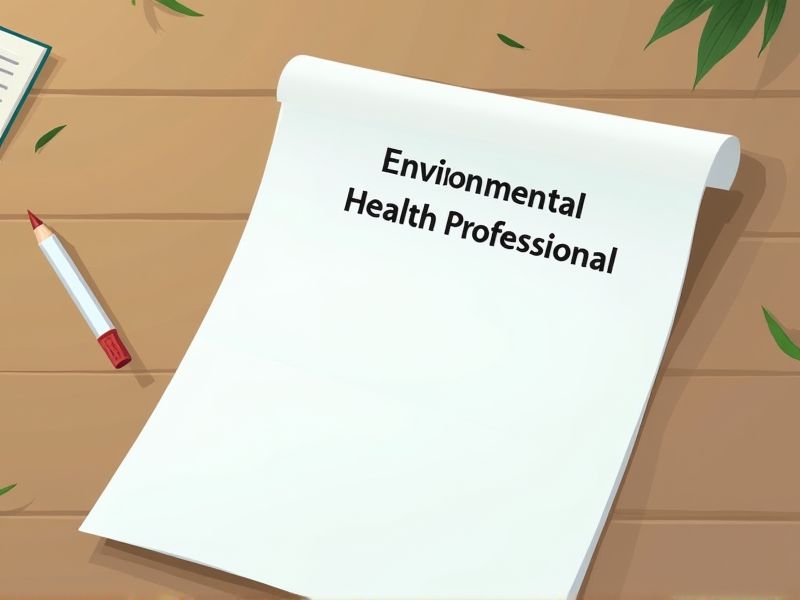
Environmental Health Professionals require specific certifications to ensure they possess the essential skills and knowledge to address public health and safety effectively. These certifications validate their expertise in risk assessment, environmental protection, and sustainable practices. They also enhance credibility and foster trust among employers, stakeholders, and the communities they serve. Below are some important certifications relevant for Environmental Health Professionals.
Registered Environmental Health Specialist/Manager (REHS/ERM)
The need for a Registered Environmental Health Specialist/Manager (REHS/ERM) arises from the increasing complexity of environmental health issues, requiring specialized expertise to effectively manage risks. Having REHS/ERM certification ensures professionals possess the necessary skills and knowledge to implement health policies and monitor compliance with environmental regulations. This certification enhances credibility and assures the community of a qualified analysis of environmental health threats. The REHS/ERM credential facilitates collaboration across different sectors, promoting comprehensive strategies to address health impacts from environmental factors.
Certified Industrial Hygienist (CIH)
Certified Industrial Hygienists (CIHs) are crucial for environmental health professionals as they possess specialized expertise in identifying and mitigating workplace health hazards. Their rigorous training and certification ensure they can effectively assess complex environmental risks, safeguarding public health. CIHs provide essential guidance on regulatory compliance, reducing potential liabilities for organizations. Their role in developing and implementing health and safety programs is vital in creating safer work environments.
Certified Safety Professional (CSP)
Acquiring the Certified Safety Professional (CSP) credential strengthens an Environmental Health Professional's expertise in identifying and managing workplace hazards efficiently. This certification signifies a professional's commitment to maintaining high safety standards, potentially reducing accident rates and enhancing workplace safety. Many employers recognize CSP as a benchmark of quality competence, leading to increased job opportunities and higher earning potential. CSP holders often contribute to improved organizational compliance with environmental regulations, which can lead to a more sustainable and safer work environment.
Certified Hazardous Materials Manager (CHMM)
The certification ensures that an environmental health professional is knowledgeable about the regulations and safety protocols related to hazardous materials. Having a CHMM designation enhances credibility when assessing and mitigating risks associated with environmental hazards. Employers often prioritize candidates with CHMM certification as it demonstrates a commitment to maintaining a safe and compliant work environment. The expertise gained through becoming a CHMM contributes to more effective management of hazardous materials, reducing potential harm to both people and the environment.
Certified Environmental Professional (CEP)
Certified Environmental Professionals (CEPs) provide critical expertise and validation of skills in environmental health, reinforcing professional credibility. Their certification reflects a commitment to staying informed on current regulations and practices, ensuring effective compliance and management. CEPs often serve as informed leaders in risk assessment and environmental policy, shaping strategies that mitigate hazards. As a result, organizations benefit from improved sustainability measures and reduced liabilities.
Board Certified in Public Health (BCPH)
Board Certification in Public Health (BCPH) validates an Environmental Health Professional's expertise, providing a competitive edge in the field. Certification signals to employers and the public that the individual meets nationally recognized standards. As a result, this can lead to increased trust and credibility when addressing public and environmental health issues. The credential is frequently linked to enhanced job prospects and potential for career advancement.
LEED Accredited Professional (LEED AP)
Environmental health professionals deal with factors that impact human health, and a LEED Accredited Professional can enhance sustainability in building projects. LEED APs provide expertise in designing environments that improve air and water quality, directly affecting public health. Their knowledge of energy-efficient and resource-conscious construction can reduce pollution and waste. Hiring a LEED AP meets increasing demands for healthier, more sustainable community infrastructures, aligning with both public health goals and regulatory standards.
ISO 14001 Lead Auditor Certification
ISO 14001 Lead Auditor Certification equips Environmental Health Professionals with the necessary skills to effectively assess and ensure compliance with environmental management standards. This certification highlights a professional's ability to identify areas of improvement within an organization's environmental practices, promoting sustainability. Having this qualification enhances career opportunities by establishing credibility and demonstrating a high level of expertise in environmental management systems. Organizations benefit from professionals with this certification, as it leads to improved environmental performance and compliance, reducing risks and potential liabilities.
Certified in Environmental Management (CEM)
Certified in Environmental Management (CEM) enhances an Environmental Health Professional's credibility by validating their expertise in sustainable practices. It ensures professionals are updated with the latest regulations and technologies, promoting compliance and efficiency. Certification often leads to career advancement by demonstrating a commitment to the field. Employers and clients are more likely to trust and collaborate with certified professionals due to their proven competence.
Occupational Health and Safety Technician (OHST)
Occupational Health and Safety Technicians are crucial for environmental health because they identify workplace hazards that could affect employee well-being. By integrating safety protocols, they help reduce workplace incidents, which lowers the risks associated with environmental health issues. Their assessments and inspections ensure that both natural and man-made environments remain safe for workers. The data they collect serves as a foundation for informed decision-making and policy development concerning environmental health standards.
Summary
You can expect to enhance your credibility and professional standing by obtaining certifications as an Environmental Health Professional. This boost in qualifications often leads to increased job opportunities and potential for higher salaries. Colleagues and employers may also perceive your expertise as more reliable and trustworthy. In essence, these certifications tend to foster career growth and professional development.
